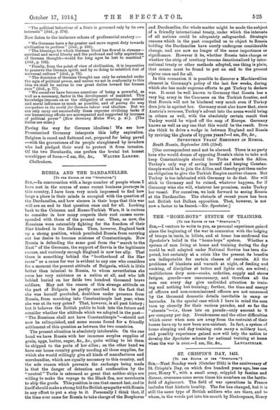RUSSIA AND THE DARDANELLES.
[To THE EDITOR OF THY " SPNCTATOlt."] SIR,—In conversation with a large number of people whom I have met in the course of some recent business journeys in this country, I have been very much impressed to find how large a place in their minds is occupied with the question of the Dardanelles, and how sincere is their hope that this war will see an end to that question once and for all. Looking hack to the Crimean and Russo-Turkish Wars, it is curious to consider in how many respects their root causes corre- sponded with those of the present war. Then, as now, the Russians were ostensibly fighting for the freedom of their Slav kindred in the Balkans. Then, however, England took up a strong position, which precluded Russia from carrying out her desire to become mistress of Constantinople. Now Russia is defending the same goal from the " march to the East" of the Germans, the support of Servia is the legitimate excuse, and curiously enough England is now her ally. That there is something behind the "brotherhood of the Slav races" as a cause for war is evident to any one who considers for a moment the present attitude of Bulgaria, which is little better than inimical to Russia, to whom nevertheless she owes her very existence as a nation at all, and who left behind buried on her fields two hundred thousand brave soldiers. May not the reason of this strange attitude on the part of Bulgaria be partly ascribed to the fact that she was herself precluded, doubtless under pressure from Russia, from marching into Constantinople last year, when she was at its very gates P That, however, is all past history; but it behoves the British public to look into the future and consider whether the attitude which we adopted in the past- " The Russians shall not have Constantinople "—should not now be relinquished, and some means found for a friendly settlement of this question as between the two countries.
The present situation is absolutely intolerable. On the one hand we have Russia with her immense surplus supplies of grain, eggs, butter, sugar, &o., &c., quite willing to let them be shipped to the ports of her allies ; on the other hand we have our home country greatly needing all these supplies, for which she would willingly give all kinds of manufactures and merchandise, which are equally necessary to this country, and the sole reason which prevents the exchange being made is that the danger of detention and confiscation by the "neutral" Turks is esteemed so great that neither ships are willing to make the voyage to the Black Sea, nor merchants to ship the goods. This position is one that cannot last, and in itself should make a strong bid for British sympathy with Russia in any effort to put a stop to it. Personally I think that, if the time ever came for Russia to take charge of the Bosphorus
and Dardanelles, the whole matter might be made the subject of a friendly international treaty, under which the interests of all nations could be adequately safeguarded. Strategic reasons which in the past compelled us to object to Russia holding the Dardanelles have surely undergone considerable change, and are now no longer of the same importance or significance. However it be, whether Russia take charge or whether the strip of territory become denationalized by inter- national treaty or other methods adopted, one thing is plain, that means must be found to put an end to the present regime once and for all.
In this connexion it is possible to discover a Machiavellian element in Germany's policy of the last few weeks, during which she has made supreme efforts to get Turkey to declare war. It must be well known to Germany that Russia has a very big army in the Caucasus on the Turkish frontier, and that Russia will not be hindered very much even if Turkey does join in against her. Germany must also know that, since Austria's reverses, Turkey's advent into the arena would bring in others as well, with the absolutely certain result that Turkey would be wiped off the map of Europe. Germany knows as well as any one that this would be the result. Does she think to drive a wedge in between England and Russia by reviving the ghosts of bygone years P—I am, sir, tte, SEVENTEEN YEARS' RESIDENT IN RUSSIA.
South Russia, September 10th (23rd).
[Our correspondent need not be alarmed. There is no party here who would dream of opposing Russia's claim to take and keep Constantinople should the Turks attack the Allies. Turkey's only way of saving herself and keeping Constan- tinople would be to join the Allies, and thereby put them under an obligation to give the Turkish Empire another chance. But Turkey is too infatuated with Germany to do that. She will stick to Germany and be ruined, whatever happens, for if Germany wins she will, whatever her promises, make Turkey her vassal. For ourselves, we look forward to seeing Russia at the Dardanelles. The obstacle of recent years has been not British but Balkan opposition. That, however, is not now a factor to be feared.—En. Spectator.]


































 Previous page
Previous page